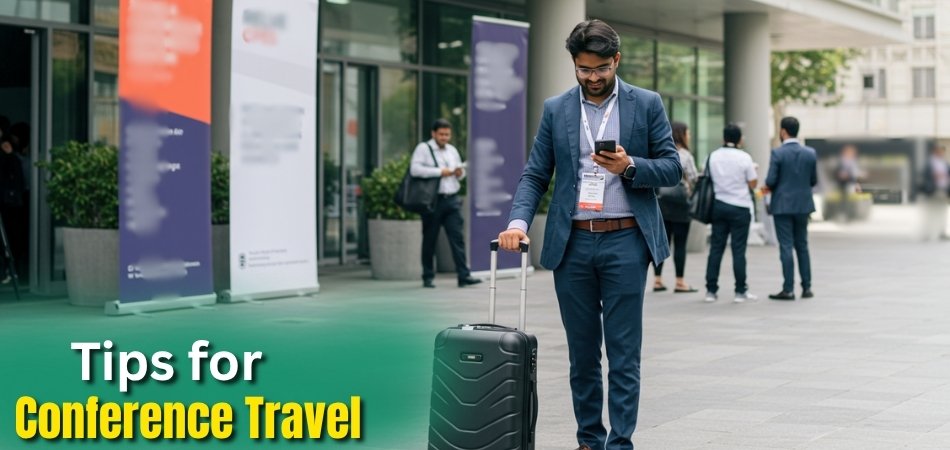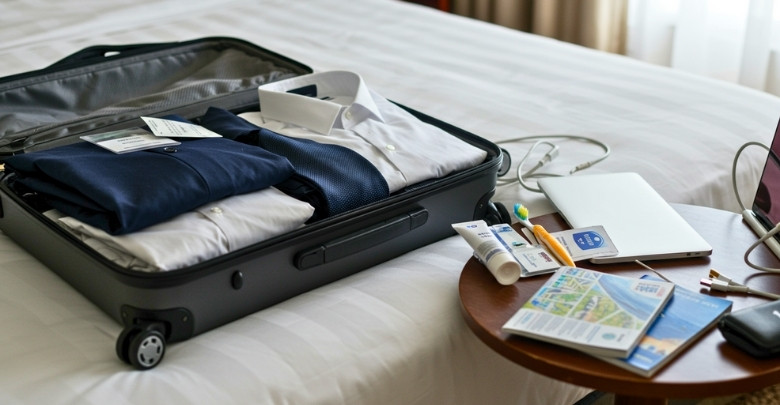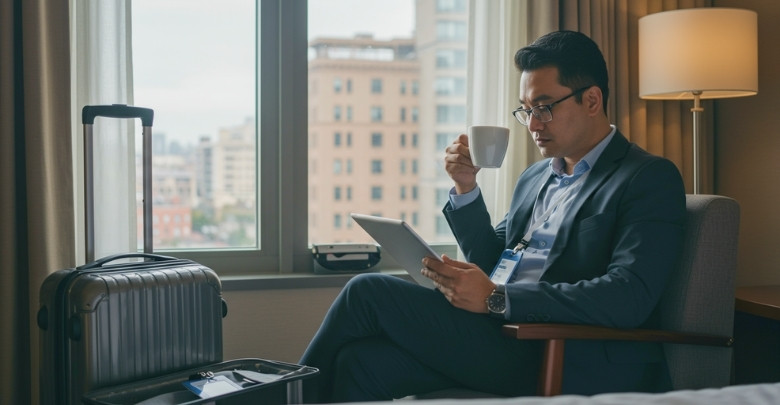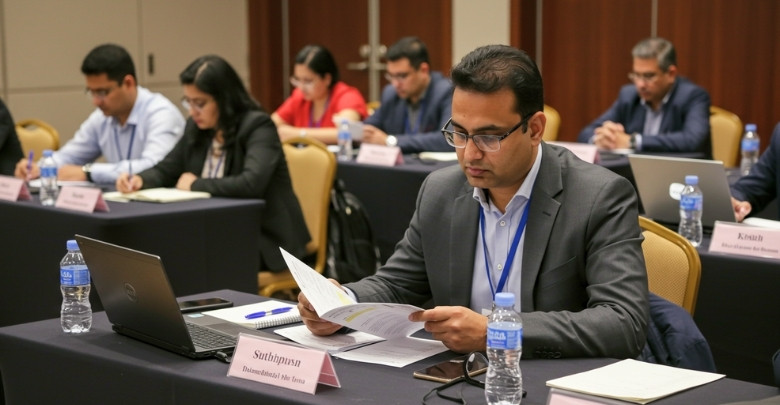Traveling for a conference can be exciting, but it also comes with its own set of challenges. From booking flights to packing smart, there are plenty of details that can make or break your experience. Without the right preparation, what should be a rewarding trip can quickly turn stressful.
A little planning goes a long way in making conference travel smoother. Simple steps like setting a budget, booking flights early, packing smart with essentials in your carry-on, and staying hydrated can save time and reduce anxiety. The goal is to focus less on logistics and more on learning, networking, and enjoying the event itself.
This guide brings you the top 20 tips for conference travel that cover everything from travel planning to on-the-ground strategies. Whether you’re attending your first conference or you’ve been to many before, these ideas will help you travel with confidence and get the most out of your experience.
20 Tips for Conference Travel
Traveling for conferences can be exciting, but it often feels stressful without proper preparation. Good planning keeps everything smooth. These practical ideas will help you learn more, meet new people, and enjoy your trip.
1. Plan Ahead
- Set a budget for your travel and book early for flights and hotels to get better prices and reduce unwanted stress during peak travel periods.
- Reviewing conference agendas before booking ensures your schedule matches important sessions and avoids missing valuable presentations or workshops.
2. Pack Smart
- A change of clothes in your carry-on helps you manage delayed luggage without worrying about appearance.
- Rolling clothes tightly in your bag creates space and prevents wrinkles, making outfits ready for busy conference mornings.
3. Stay Hydrated
- Carrying a reusable water bottle prevents dehydration and gives you energy for long, demanding event sessions.
- Drinking water regularly keeps your focus sharp and supports healthier digestion during travel days and conference meals.
4. Network Before the Event
- Connecting with attendees on LinkedIn builds familiarity and reduces nervousness when meeting new people onsite.
- Joining event groups on Twitter or apps makes networking easier and creates friendly conversations before traveling.
5. Use Transportation Apps
- Downloading ride apps in advance saves time and avoids confusion when arriving in a busy, unfamiliar city.
- Checking local travel options helps you understand costs quickly and ensures smooth movement between hotels and venues.
6. Map the Venue and Hotel
- Saving maps and addresses in your phone makes navigation faster and avoids unnecessary stress before sessions.
- Walking routes between hotels and conference halls give you confidence and keep you on schedule easily.
7. Ask for Hotel Upgrades
- Politely asking staff about room improvements can sometimes get you better spaces at no extra charge.
- Small upgrades like higher floors or free breakfasts create comfort and make conference mornings more relaxed.
8. Make Dinner Reservations
- Popular restaurants near event venues often fill quickly, so booking early ensures enjoyable dinners without stress.
- Planning meals ahead also gives you a chance to explore local food while keeping your schedule balanced.
9. Carry Pain Relief
- Simple medication helps with headaches, sore muscles, and sudden discomfort during long travel or busy conferences.
- Keeping tablets in a travel pouch ensures quick relief and avoids unnecessary breaks from scheduled sessions.
10. Bring a Power Strip
- Outlets at conferences are limited, so carrying a strip helps keep devices charged throughout long days.
- Offering others space on your strip creates friendliness and sparks conversations with people you meet.
11. Pack Business Cards
- Business cards remain useful for quickly sharing details when meeting professionals in crowded hallways.
- Keeping them in a pocket ensures fast access and avoids interruptions during engaging conversations.
12. Bring Conference ID/Lanyard
- Keeping your badge handy makes moving between sessions easier and saves valuable time throughout the day.
- Wearing lanyards also signals participation and encourages casual introductions with fellow attendees.
13. Pack Charging Cables and Adaptors
- Carrying spare charging cables keeps your devices ready even if one gets misplaced or damaged unexpectedly.
- International adaptors are important when conferences happen abroad, ensuring your electronics remain functional.
14. Dress Appropriately
- Wearing clothes that match event codes helps you feel confident while staying comfortable during long schedules.
- Comfortable shoes matter because walking between venues and networking areas often involves significant distances.
15. Personalize Your Schedule
- Choosing sessions in advance helps you focus on important learning opportunities without rushing or missing speakers.
- Highlighting must-attend events also reduces decision-making stress during conference days.
16. Bring Snacks
- Having healthy snacks handy prevents energy crashes and reduces reliance on limited or expensive food options.
- Quick bites like nuts or granola keep you satisfied between long lectures and networking events.
17. Plan for Rest
- Scheduling short breaks helps you recharge and ensures better focus during important sessions.
- Taking time for sleep or quiet activities prevents burnout and allows stronger networking conversations.
18. Research Local Customs and Food
- Exploring local cuisine enriches your trip, but balancing meals around sessions ensures productivity remains high.
- Understanding local etiquette shows respect and builds stronger connections with international attendees.
19. Carry Hand Sanitizer and Masks
- Using sanitizer regularly keeps you safe from germs, especially in crowded venues and airports.
- Masks provide added safety in packed halls and help protect your health during travel.
20. Stay Organized
- Using apps or notebooks helps you track contacts, session notes, and follow-up plans effectively.
- Organizing details daily ensures smoother reflection later and avoids losing valuable information.
Conference travel is about balancing preparation, learning, and connection. Whether you are attending events in the United States, Germany, Singapore, or elsewhere, planning makes a huge difference. For instance, if you explore upcoming conferences in USA, these same strategies will keep your trip stress-free. A little structure allows you to enjoy more, worry less, and return home with lasting knowledge and connections.
Why Plan Your Conference Trip Early?
Traveling for a conference can be fun, but it also comes with many small things to manage. Packing bags, booking tickets, and finding hotels can quickly feel confusing without a clear plan set earlier. When everything is left for the last moment, stress builds faster than expected. A little preparation ahead of time saves effort, keeps you relaxed, and makes your trip more enjoyable.
Save Money
Booking flights and hotels earlier usually means lower prices and more choices. Waiting too long can make costs rise quickly. Many hotels near the event location sell out fast, leaving you with fewer options. Planning ahead saves your budget and gives you peace of mind.
Better Choices
Early planning gives you more options for where to stay and how to travel. You can choose hotels closer to the venue, which saves time every morning. Train and flight schedules are easier to adjust when tickets are booked early. More choices often lead to a smoother trip.
Less Stress
Knowing that your tickets and hotel are already booked helps you feel calm before the conference begins. You won’t need to rush at the last minute or worry about missing something. Early planning gives you more time to focus on your presentations. Feeling relaxed lets you enjoy the event fully.
Time Management
When you plan ahead, you can organize your conference days better. Checking the agenda early helps you decide which sessions to attend. You can balance learning, networking, and rest without feeling rushed. This way, your time is used wisely and effectively.
Good Preparation
Planning early lets you prepare the things you need for the trip. You can pack the right clothes and make sure important items are not forgotten. If you need documents, you will have them ready in advance. Being prepared keeps your trip stress-free.
Health and Comfort
Booking earlier allows you to choose better seats on flights and comfortable hotel rooms. You can plan rest times into your schedule without rushing. Taking care of your health is easier when your trip is well-organized. Comfort matters when you spend long days at events.
More Confidence
Knowing everything is already arranged makes you feel confident during the conference. You can walk into the event with focus, not worry. This confidence also makes networking easier because you are calm and present. A planned trip sets the right tone for success.
Best Packing List for a Multi-day Conference
Packing for a multi-day conference can feel exciting, but it often becomes tricky without a clear plan. Many people worry about forgetting important items while trying to fit everything into one suitcase. Choosing what to bring takes thought and good organization. With this packing list, you can stay prepared and confident throughout your trip:
Clothing Essentials
Bring enough outfits for each day so you look fresh and professional at every session. Adding a blazer or jacket gives you a polished look, even if the rest of your outfit is simple. Comfortable shoes are important since you may walk or stand a lot. Don’t forget casual clothes, pajamas, and enough socks and underwear for the entire trip.
Daily Essentials
Your conference badge, ID, and travel documents should be easy to reach at all times. Business cards or a digital code help when meeting new people and sharing information quickly. A water bottle and snacks keep you energized during long sessions without waiting for breaks. Packing an umbrella, sanitizer, and small medicines keeps you prepared for anything unexpected.
Tech Must-Haves
Chargers, cables, and a power bank are necessary to keep your devices ready all day. A power strip is a great idea since outlets are usually limited at event spaces. Headphones can be useful when you need quiet time or want to listen privately. If the conference is abroad, a travel adapter ensures all your gadgets work smoothly.
Personal Care
Toiletries like toothbrush, toothpaste, and deodorant should never be forgotten. A hairbrush, makeup, and grooming items keep you looking professional and fresh. Sunglasses, glasses, or contact lenses with solution are important for comfort during the day. A travel steamer or lint roller keeps your clothes looking neat and wrinkle-free.
Smart Preparation
Carrying a notebook or using a digital app helps with taking notes and tracking important points. A padfolio or folder keeps handouts organized and easy to find later. A neck pillow makes travel more comfortable, especially on long flights. Adding a sturdy backpack ensures you can carry daily items with ease, and it connects perfectly with other conference travel preparation tips.
How to Budget for Conference Travel and Expenses?
Average budgets for conference attendance typically range from $500 to $2,500, depending on the location, type, and duration of the event. Budgeting thoroughly helps ensure a productive and stress-free conference experience without overspending.
Budgeting for conference travel and expenses requires careful planning of all potential costs, including registration, travel, accommodation, meals, and incidentals. Here is a guide to effectively budgeting for conference travel:
- Set a Clear Total Budget: Decide on the maximum amount available for the entire trip to avoid overspending and prioritize expenses.
- Research Registration Fees: Find the cost of conference registration, including any early bird discounts or group rates.
- Estimate Travel Expenses: Calculate airfare, train, car rental, local transportation, parking, and related travel fees.
- Choose Accommodation: Select a lodging option near the venue to fit within your budget; consider discounts or shared rooms.
- Budget for Meals and Daily Costs: Allocate for meals not provided, snacks, coffee breaks, and incidental expenses.
- Allocate for Networking and Optional Activities: Include fees for dinners, workshops, and social events, which may add value.
- Prepare for Miscellaneous Costs: Account for unexpected expenses such as printing, emergency purchases, personal spending, and set aside a contingency fund.
- Document and Justify: Prepare a detailed budget with cost breakdowns per item, supported by explanations of each anticipated cost.
- Consider Cost-Saving Strategies: Use early bookings, discounted rates, and sharing costs with others to stretch the budget.
- Review and Adjust Budget: Update the budget to reflect actual costs as plans solidify.
What Strategies to Use for Effective Networking at Conferences?
Conferences bring together people from many places, each with different ideas, skills, and exciting opportunities to share. Walking into a hall full of strangers may feel scary, but it also opens doors to learn and connecting. Meeting others face-to-face gives you chances you cannot always find online. With these strategies, these events can turn into valuable experiences for your future:
Be Approachable
A friendly smile makes others feel comfortable starting a conversation with you. Keeping open body language shows you are interested and ready to listen. Try not to stand in closed groups that seem difficult for others to join. Being approachable helps you create new friendships faster.
Prepare Questions
Think of simple questions about the event, sessions, or even local food to spark conversations. People enjoy sharing their thoughts when asked in a kind way. Asking questions shows you are paying attention and want to learn. Good questions can turn short talks into longer discussions.
Share About Yourself
When someone asks about you, give short but clear answers. Talking too much about yourself can seem boring. Share your interests or what you are excited about at the event. This gives people an easy way to connect with you.
Exchange Contacts
Carrying business cards or using digital contact-sharing apps makes it easy to stay connected. Exchanging details ensures the conversation doesn’t end when the event does. Write small notes on cards to remember who they are later. Keeping contact information organized helps you follow up quickly.
Join Group Activities
Many conferences include group meals, workshops, or casual meetups. Joining these activities helps you meet people naturally. You don’t have to know anyone to participate, just show up and talk. Group settings are great for building connections without pressure.
Listen Carefully
When someone speaks, give them your full attention. Nodding and keeping eye contact makes them feel valued. Interrupting too often can make conversations uncomfortable. Listening well helps you learn more and makes others enjoy talking with you.
Follow Up
After the conference, send a short message to the people you met. Thank them for their time or mention something you discussed. This small step helps keep the connection alive. Following up shows you are serious about building a real relationship.
How to Manage Jet Lag During Conference Trips?
Traveling across time zones can be exciting, but it often leaves your body feeling tired and confused. Sleeping at the wrong hours can make you groggy when you need energy the most. Conferences demand focus, so jet lag can feel especially frustrating. With these smart habits, you can adjust faster and enjoy the trip more:
Adjust Sleep Early
Start shifting your bedtime a few days before you travel. Moving your sleep one hour at a time helps your body adjust. This small step makes the new time zone less of a shock. You’ll arrive feeling more in sync with local hours.
Drink Enough Water
Dehydration makes jet lag symptoms feel worse and slows down recovery. Keep a water bottle handy and sip regularly. Avoid alcohol and caffeine during the flight because they disturb your sleep patterns. Staying hydrated helps your energy levels remain steady.
Choose Flight Times
When possible, book flights that match your natural sleep cycle. Overnight flights are useful for getting rest on the plane. If your body is used to sleeping at certain hours, it’s easier to stay on track. This timing trick helps you adjust smoothly.
Use Daylight
Sunlight is one of the best ways to reset your body clock. Spend time outside after you land to soak up daylight. Even a short walk can make your body feel awake. Bright light signals your brain to adjust faster.
Take Short Naps
Naps can be useful, but keep them under 30 minutes. Longer naps may confuse your body and make night sleep harder. A quick nap refreshes your mind without affecting bedtime. This balance helps you stay alert during conference sessions.
Local Meal Times
Eating at the same times as locals helps your body learn the new schedule. Even if you aren’t hungry, light meals help send signals. Avoid heavy or late-night meals as they make it harder. Small changes with food can support your adjustment.
Stay Active
Light exercise keeps your body moving and fights off fatigue. A walk or stretch after arrival makes a big difference. Exercise also boosts circulation, which helps with stiffness from long flights. Staying active makes you feel awake and alert.
Relax Naturally
Instead of reaching for sleeping pills, try simple relaxation methods. Deep breathing or quiet meditation before bed helps calm your body. Relaxation reduces stress and encourages natural sleep. These habits are healthier for dealing with conference travel anxiety as well.
Stay Calm
Mindfulness and grounding techniques are useful when travel stress feels overwhelming. Closing your eyes and focusing on breathing helps. Small routines before bed, like reading or listening to calm music, make a difference. Staying calm helps your body settle into new rhythms.
What Tech Gear to Bring for Conference Presentations?
Standing in front of an audience can feel exciting, but it also brings the pressure of being prepared. Presentations often depend on working tech, and one small mistake can quickly cause problems. Having the right tools keeps things running smoothly every time. Here are the tech gear items you can bring for the conference presentation:
Reliable Laptop
A laptop is the most important tool for presenting slides, videos, and important notes. Make sure it is fully updated before the event. Carry a backup copy of your files on a USB drive just in case. Keeping everything organized helps avoid last-minute stress.
Projector Connections
Different venues often use different projector systems, so carrying the right adapters is important. Common options include HDMI and VGA adapters. Having your own ensures you can connect without waiting for help. This small step saves time and keeps your talk flowing.
Portable Charger
Long days at conferences can drain your devices quickly. A portable charger keeps your laptop, tablet, or phone powered. This means you don’t have to rush around looking for outlets. Staying charged lets you focus on your presentation, not your battery life.
Good Headphones
Headphones are useful for checking audio before your presentation. They also help when you need quiet time to prepare. Good sound can make a big difference when editing or practicing. Keeping them handy is a simple but valuable choice.
Backup Tools
Always bring extra cables, a pointer, or even a wireless mouse. These small items often get lost or forgotten. A backup set ensures your presentation goes on without delay. Simple preparation makes you look professional and well-organized.
Tips to Stay Organized During the Conference
Conferences can feel exciting, but also overwhelming with busy schedules, endless sessions, and so many new people to meet. Without planning, you might lose track of time and miss useful opportunities. Staying organized helps you enjoy more and stress less. Here are simple tips to keep everything under control during the event:
- Use a Planner: Write down your daily sessions in a small planner, so you know exactly where to be without confusion.
- Keep Contacts Together: Store all new business cards in one pouch, making it easier to remember faces and follow up afterward.
- Pack Smartly: Carry only important items in your bag, so you don’t waste energy dragging around things you don’t need.
- Set Daily Goals: Decide what you want to achieve each day, whether it’s attending three sessions or meeting five new people.
- Organize Notes: Use a notebook or digital app to separate notes by topic, ensuring quick access later when reviewing key points.
- Charge Devices: Always recharge your phone and laptop at night, because running out of battery during important sessions feels frustrating.
- Review Each Night: Look back at your schedule and notes before sleeping, so the next day feels smoother and more focused.
FAQs about Tips for Conference Travel
Traveling for a conference brings both excitement and responsibility. Many people have questions about how to handle small details during trips. Here are some frequently asked questions with helpful answers to make your conference travel smoother and less stressful.
What Should I Do If My Luggage Gets Lost?
If your luggage gets lost, report it immediately at the airline desk and provide your travel details. Always keep essentials, a change of clothes, and important documents in your carry-on to manage until your luggage arrives safely.
How Can I Save Money on Meals During Conferences?
Meals at conferences can get expensive quickly, especially in popular cities. Consider eating breakfast at your hotel or packing light snacks. Research nearby affordable restaurants before your trip, and sometimes conferences also provide free food during networking events.
Is It Important to Join Social Events at Conferences?
Yes, social events are often as valuable as formal sessions. These gatherings help you connect with people in a relaxed setting. Attending can lead to opportunities, collaborations, and friendships you might miss if you only join scheduled talks.
How Do I Avoid Overpacking for a Conference?
Start by planning your outfits for each day, including backup options. Stick to versatile pieces that can mix and match. Rolling clothes saves space, and limiting shoes helps reduce weight. Packing smartly makes travel easier and less stressful.
What’s the Best Way to Keep Conference Notes Organized?
Use one dedicated notebook or a digital app to write down key ideas and contacts. Organize notes by sessions or topics for easier reference later. Keeping everything in one place ensures you don’t lose valuable information.
How Early Should I Arrive at the Conference Venue?
Arrive at least 20–30 minutes early, especially on the first day. This gives you time to register, find your seat, and explore the layout. Arriving early also allows for casual networking before sessions officially begin.
Should I Carry Cash Along With Cards?
Yes, carrying some cash is always smart because not every place accepts cards. Small expenses like taxis, snacks, or tips often require cash. Having a mix of both ensures you’re never stuck without a payment option available.
How Do I Maintain Energy During Long Conference Days?
Energy can drop quickly during long days. Keep snacks like protein bars handy, drink plenty of water, and take short breaks. Comfortable shoes and light stretching also help keep your body active and your mind more alert.
How Can I Handle Conference Overload?
Conferences often feel overwhelming because of crowded schedules. Select sessions carefully and skip some if needed. Take quiet breaks, review your notes, and focus on your goals. Giving yourself space helps prevent burnout and makes learning easier.
What’s the Best Way to Follow Up After a Conference?
Send a quick message or email within a few days of meeting someone. Mention your conversation to remind them who you are. This shows professionalism and helps you maintain meaningful connections after the event has ended.
Closing Remarks
Conferences are not only about listening to speakers but also about learning new things and meeting people. Travel can feel stressful, but small steps make it easier. The 20 tips for conference travel show how to prepare and stay organized. Packing light, planning early, and keeping energy up all help reduce problems.
Simple choices like carrying snacks, staying hydrated, and writing notes keep things smooth. When travel feels easy, you can enjoy the event more. With the right planning, you return home with less stress, more knowledge, and better connections that last even after the conference ends.










